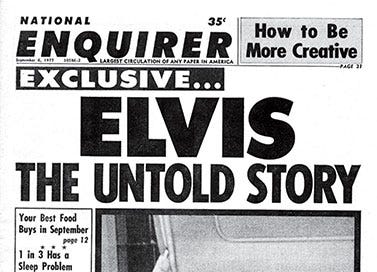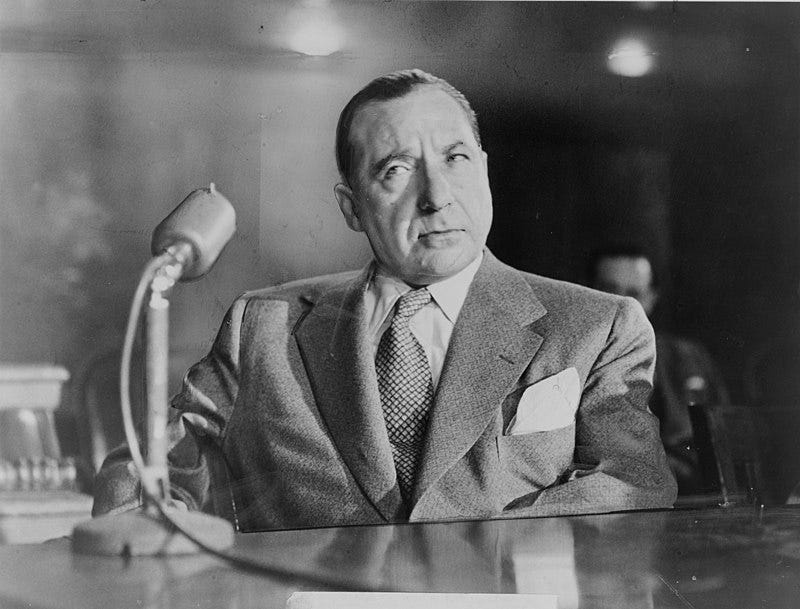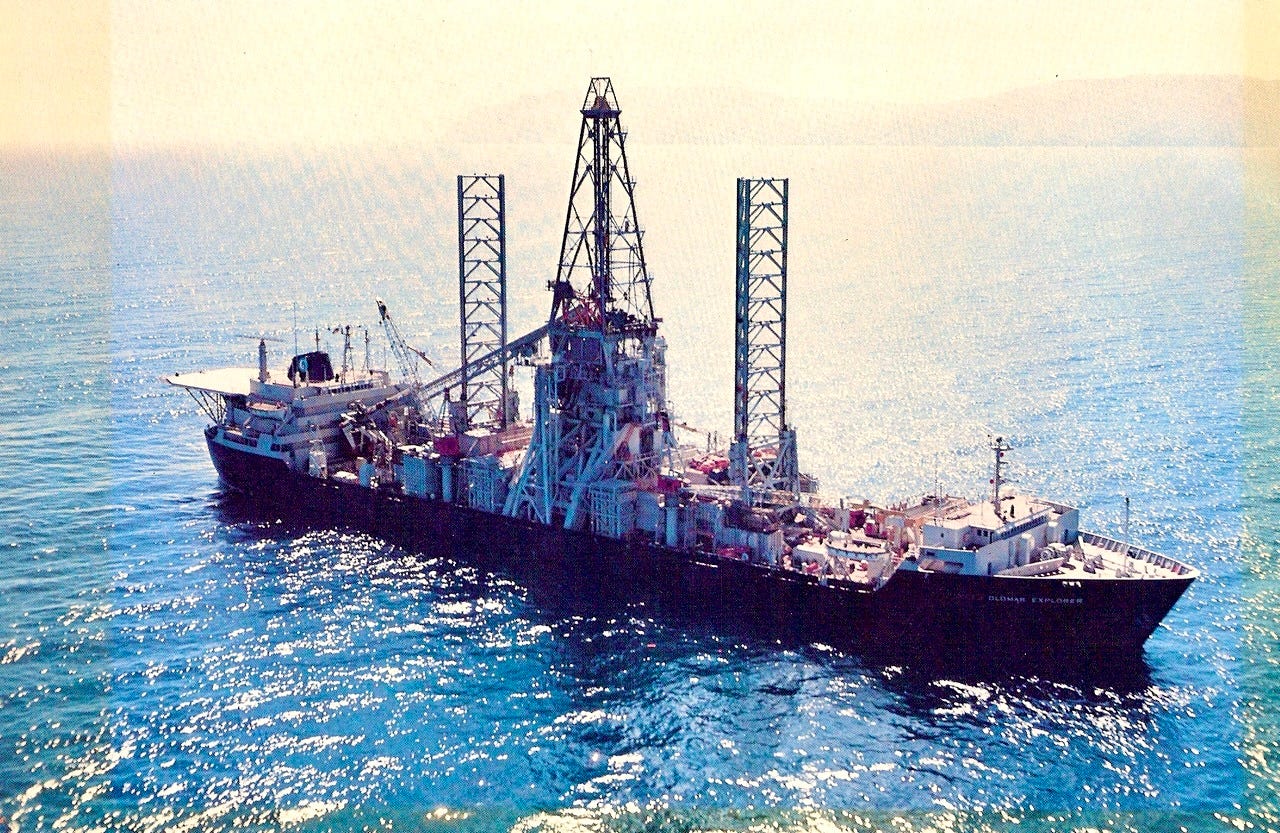For enquiring minds that want to know, here four things you never knew about the founder of The National Enquirer:
1. His father was a fascist.
2. His two brothers were convicted of fraud.
3. His godfather was a top mafia don.
4. He worked for the CIA.
Sensational stuff, no?
All true.
Where to begin?
At the beginning, I guess, in 1905, when Generoso Pope, at the age of 13, arrived in New York City through Ellis Island from Italy with four dollars in his pocket.
Thirteen must have been Generoso's lucky number. And he was smart.
Because by 1930, Pope had realized the American Dream (as opposed to the European Nightmare—World Wars I & II): He became the first self-made Italian millionaire in the USA.
Colonial Sand and Stone, Pope's cement company, literally paved the streets of Manhattan.
With his profits, the concrete baron purchased Il Progresso, New York's large-circulation Italian newspaper. All through the 1930s, Pope penned and published editorials that glorified Benito Mussolini, Italy's fascist leader,. He even tripped back to Italy to meet Mussolini. Twice.
Needless to say, FBI Director J. Edgar Hoover was not amused. His gumshoes began reading Il Progresso with a magnifying glass and filing numerous memos on what the hell Pope thought he was doing.
After World War II started, Hoover wanted to throw Pope’s butt in jail.
But the more creative intel-types, serving under William "Wild Bill" Donovan in the Office of Strategic Services (forerunner to the CIA), wanted to turn Pope around, show him the error of his ways—and put him to work for the good guys.
That's the essential difference between the Bureau and the OSS/CIA.
The Bureau is law enforcement. They want to build a case and throw someone in jail. The Agency wants to change a person's thinking, then use him against the enemy for the greater good.
OSS won out. The year was 1941. A visit was paid to Generoso. He was made to see the error of his ways and Il Progresso turned against Mussolini.
After the war ended and Mussolini was gone, when Italy's communists were gaining strength in the late 1940s, a letter-writing campaign from the USA helped turn things around—a campaign conceived by the CIA and executed by Pope and his Italian-language paper.
Thousands and thousands of Italian-Americans were instructed by that newspaper to write letters to all of their friends and relatives about the evils of communism to all of their relatives in Italy.
And that wasn't all.
CIA filtered cash-money through Generoso Pope for church, student and labor groups and to finance a spectrum of covert operations that in 1948 ensured a Christian Democratic election victory in Italy.
This is where the CIA's relationship with the mafia is rooted; not in their mutual contempt for Castro, but in the salvation of Italy from a communist sweep.
"Lucky" Luciano, the notorious mobster, was a big provolone in helping CIA keep the communists out of power in Italy. His boys worked the docks. These guys had to keep their olive oil flowing.
Back to Generoso Pope.
His best friend in the whole world was Frank Costello, known by New York newspapers as "prime minister of the underworld."
Costello—a.k.a. "Uncle Frank" and "the Boss of Bosses"—controlled Tammany Hall, New York's democratic party machine, which hand-picked mayors, police commissioners and judges.
As New York's "Godfather of Godfathers" (this guy had too many nicknames), Costello was chosen by Pope to be godfather, in the religious sense, to Generoso “Gene” Pope, Jr., the third of Pope's three sons.
Gene's two older brothers, Fortune and Anthony, joined the concrete business while Gene edited Il Progresso.
CIA
In 1951, a year after his old man died, Gene boarded a train to Washington, D.C. to join the Central Intelligence Agency. He was assigned to psychological warfare, the unit that dealt with propaganda and experimented with brainwashing.
(An aside here: As former CIA founding member Miles Copeland once told me: “The CIA guy who invented modern psychological warfare was Paul Linebarger, who wrote the definitive text on the subject— and a string of sci-fi books under the pseudonym Cordwainer Smith. He'd start his lectures by walking into a room filled with colonels, his glass eye pointed one way and his real eye pointing another, and he'd say to a real stuffy West Pointer, ‘Have you ever fucked your brother?’ This guy would get up and—wham!—hit Linebarger on his chin, sending his glass eye in one direction and false teeth in another. And Linebarger would get up and say, ‘See! I've reduced this man to a raving idiot just by the use of one phrase! See what words can do?’)”
Back to Gene Pope, who finished his training and returned to New York in April 1952, to Il Progresso.
A funny thing happened; funny in the odd sense. His elder brothers wanted to slot him as an employee, not a partner. They would not have pulled this shit when their old man was alive; Gene had been the apple of his father's eye.
Gene possessed an Italian temperament. He lost his cool and never spoke to either brother again, preferring to walk away penniless from his family's multi-million dollar businesses. He went hunting for his own newspaper.
The New York Enquirer caught Gene Pope’s eye. This broadsheet, founded in 1926, had seen better days but by then had been run into the ground by William Griffin, Jr., the founder's son.
"Uncle Frank" Costello spent two months negotiating the Enquirer’s price down to $75,000, then came up with 20-grand needed for a down-payment.
Costello also planted a few words in the ear of fellow horse-race gambler J. Edgar Hoover, resulting in an investigation of Pope's brothers, who were thought to be skimming funds from their cement business.
Fortune and Anthony were eventually convicted of fraud.
If you were going to have a godfather, Frank was the man.
Worldwide Intelligence Column
One of the first things Pope did with the New York Enquirer was add a feature he called Worldwide Intelligence Column, written anonymously.
The first word about purges in Czechoslovakia appeared in this column, and it authoritatively named Czech officials on the way out.
A startling exclusive about new developments in germ warfare research by the Chinese appeared in this column. (Now that’s foretelling….)
A scoop about an atomic bomb accident in the Soviet Union appeared in this column.
Thus, the New York Enquirer, under Gene Pope, became the CIA's vehicle for breaking stories it wanted the world to know.
But even with CIA's exclusive stories, Pope couldn't raise his newspaper's circulation and Uncle Frank had to cough up $10,000 a week in operating expenses to prevent the paper from folding.
In return, the New York Enquirer reported that the Italian Mafia was a myth perpetuated by communist propaganda.
This prompted New York Mirror columnist Lee Mortimer to write: "As soon as anyone goes after the mob, he's taken on the following week by that loathsome blackmail sheet that's 'owned' by Frank Costello's godson."
Blood & Gore
In a morose moment, Pope decided that his readers wanted blood and gore. Let it bleed, he instructed his editors. The paper began to print lurid photographs of bloody car wrecks and gruesome murders. ("Madman Cut Up Date & Put Her Body In Freezer.")
Circulation tripled.
Pope quickly earned a national reputation. So he re-christened his newspaper The National Enquirer.
However, the gruesome nature of this national paper soon caused a personal hiccup for him. Pope was a police groupie, a frustrated cop. That's why he joined CIA: He had dreams of becoming a super-policeman.
To satiate this need in his godson, Uncle Frank used his political connections to have Pope named an honorary deputy commissioner of police.
But when blood and gore filled the Enquirer’s pages, the good burghers of New York City found it distasteful that the man who glorified murder and mayhem should be an honorary policeman. So they revoked the title and stripped him of his badge.
Embarrassed, and believing there was no future in blood and gore, Pope plotted a new course for his tabloid—one that would make it truly national, and gender-bending (his readers till then were exclusively blue-collar male).
The recipe called for a large helping of celebrity scandal and titillation, a measure of self-help, a spoonful of the occult and a dollop of inspirational uplift.
Gee Whiz Journalism was born—and circulation took off big-time, reaching six million.
During the transition, mobster Frank Costello served a stint in prison.
When Uncle Frank was released in 1961, he reached out to his now-prosperous godson for a helping hand, a repayment for setting him up in business years earlier.
But Pope rebuffed his godfather, pleading new respectability that precluded an association with an ex-con.
Henceforth, fearing retaliation, Pope surrounded himself with off-duty police officers.
Pope knew better than to screw CIA the way he screwed Frank Costello. It was a psychological thing, ultimately. He hadn't aspired to be a mobster; he wanted to be a super-cop. Hence, Pope adored the CIA.
In the mid-1970s, when Senator Frank Church and everyone in the media beat up on the CIA, Pope was there for them.
He published stories trashing the people who were trashing CIA. ("Public Disclosures Destroying CIA" and "Lives of All Americans Have Been Put in Danger by Headline Hungry Politicians Who Are Crucifying CIA.")
His was probably the only paper that stood up for CIA at its greatest time of need.
Problem was—for CIA, anyway—nobody of any consequence in Washington read the damn thing.
The Glomar Explorer
Reporters from The National Enquirer uncovered the Glomar Explorer operation long before anyone else in the fourth estate.
This was an extremely sensitive, mission-impossible-type covert operation to salvage a sunken Soviet nuclear submarine from the floor of the south Pacific.
Pope spiked the story, though it could have been a major scoop for his paper.
Another time, a freelance photographer in Helsinki, Finland, used a high-powered telephoto lens to snap Secretary of State Kenry Kissinger reading some documents. Enlargements showed the docs to be a top secret memo from President Ford outlining the US negotiating strategy for SALT talks with the Soviets.
The photographer sold his prints and negatives to The National Enquirer, known internationally for paying the biggest money for one-of-a-kind pictures.
Did the tabloid publish these expensive photos and score brownie points among its readers and other media for revealing a serious breach of security (and Henry's incompetence)?
Of course not.
Gene Pope boarded a train from Florida, where he had settled himself and his tabloid, to Washington (he had a fear of flying)—and personally hand-delivered the offending photographs (and negatives) to CIA Director William Colby.
Gene Pope, Jr. dropped dead from a heart attack in October 1988.
His Last Testament demanded that The National Enquirer, which he owned lock, stock and barrel, be put on the auction block, where it fetched half-a-billion dollars.







